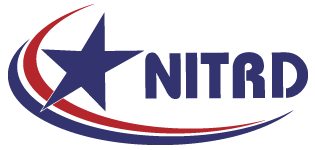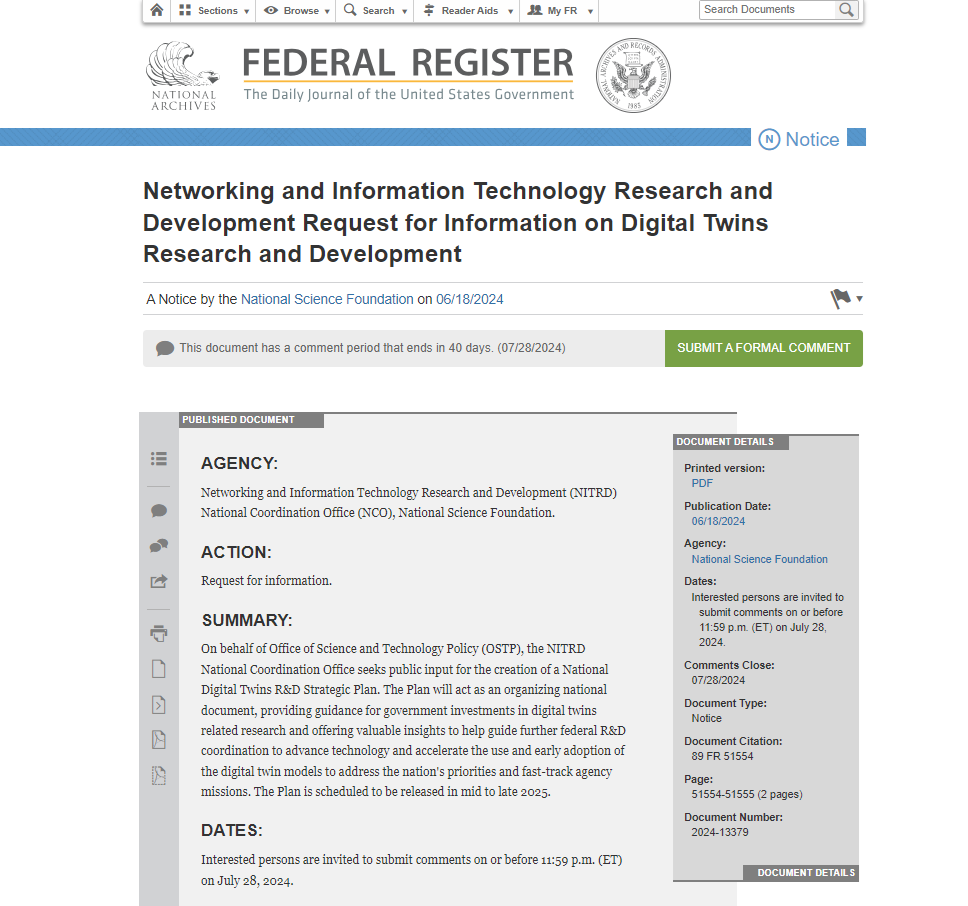Federal Register Notice: 89 FR 51554
AGENCY: Networking and Information Technology Research and Development (NITRD) National Coordination Office (NCO), National Science Foundation (NSF).
ACTION: Request for information.
SUMMARY: On behalf of Office of Science and Technology Policy (OSTP), the NITRD National Coordination Office seeks public input for the creation of a National Digital Twins R&D Strategic Plan. The Plan will act as an organizing national document, providing guidance for government investments in digital twins related research and offering valuable insights to help guide further federal R&D coordination to advance technology and accelerate the use and early adoption of the digital twin models to address the nation’s priorities and fast-track agency missions. The Plan is scheduled to be released in mid to late 2025.
DATES: Interested persons are invited to submit comments on or before 11:59 p.m. (ET) on July 28, 2024.
ADDRESSES:
Comments submitted in response to this RFI may be sent by any of the following methods:
- Email: DigitalTwins-ftacRFI@nitrd.gov; Email submissions should be machine-readable and not be copy-protected. Submissions should include “RFI Response: Digital Twins R&D Plan” in the subject line of the message.
- Mail: Attn: Melissa Cornelius, 2415 Eisenhower Avenue, Alexandria, VA 22314, USA. Telephone: 202-459-9674.
Instructions: Response to this RFI is voluntary. Each individual or institution is requested to submit only one response. Submissions must not exceed 10 pages in 12 point or larger font, with a page number provided on each page. Responses must include the name of the person(s) or organization(s) filing the comment and the following statement: “This document is approved for public dissemination. The document contains no business-proprietary or confidential information. Document contents may be reused by the government in the National Digital Twins R&D Strategic Plan and associated documents without attribution.” Responses to this RFI may be posted online at https://www.nitrd.gov/. Therefore, we request that no business proprietary information, copyrighted information, or sensitive personally identifiable information be submitted as part of your response to this RFI.
In accordance with FAR 15.202(3), responses to this notice are not offers and cannot be accepted by the Government to form a binding contract. Responders are solely responsible for all expenses associated with responding to this RFI.
FOR FURTHER INFORMATION CONTACT:
Craig Schlenoff, Melissa Cornelius, Simon Frechette, Stacey Levine, Steven Lee, Qing Wu at DigitalTwins-ftacRFI@nitrd.gov or (202) 459-9674. Individuals who use a telecommunications device for the deaf (TDD) may call the Federal Information Relay Service (FIRS) at 1-800-877-8339 between 8 a.m. and 8 p.m., Eastern time, Monday through Friday, except for U.S. Federal Government holidays.
SUPPLEMENTARY INFORMATION:
The National Academies of Sciences, Engineering, and Medicine (The National Academies) released its report on digital twins, Foundational Research Gaps and Future Directions for Digital Twins (2024). The report makes recommendations for federal agencies to launch crosscutting programs to advance mathematical, statistical, and computational foundations for digital twins and identify collaborative opportunities. In response to this, the Fast-Track Action Committee (FTAC) on Digital Twins (DT) is developing a National Digital Twins Research and Development (R&D) Strategic Plan (the Plan) that lays out the Digital Twins R&D priorities within federal agencies.
Terminology: As defined in The National Academies report, Foundational Research Gaps and Future Directions for Digital Twins, A digital twin is a set of virtual information constructs that mimics the structure, context, and behavior of a natural, engineered, or social system (or system-of-systems), is dynamically updated with data from its physical twin, has a predictive capability, and informs decisions that realize value. The bidirectional interaction between the virtual and the physical is central to the digital twin. This definition will be used for the purposes of this RFI, but respondents are welcome to provide alternate definitions if digital twins have a different meaning in their industry or field, along with the scientific rationale for specific use-cases. Reference citation as appropriate.
Information Requested: Responsible innovation in digital twins could provide significant benefits for the American people. This RFI seeks input to shape a whole-of-government effort on research and development related to digital twins across domains. Examples include but are not limited to biomedical sciences, climate change, smart cities, and scientific discovery. This RFI is soliciting R&D topic areas in which the strategic plan should focus, as well as details that should be considered when/if the topic area is elaborated in the strategic plan. Example topics are included below, but we welcome other topics as appropriate. Respondents may provide information related to one or more of the topics outlined below and should indicate the topic to which they are responding by using the keyword in bold. Possible topics include (listed in alphabetical order):
- Artificial Intelligence (AI): AI and Digital Twins: Possible focus areas: integration of digital twins with artificial intelligence (AI); leverage generative AI for digital twin modeling & simulation with the consideration of the potential impact on a digital twins’ physical counterpart
- Business: Business Case Analysis: Possible focus areas: foundational research cost; evaluate value/return on investment; cost and time to implement
- Data: Encourage Adoption of Data Management Best Practices: Possible focus areas: governance methods for data collection, curation, sharing and usage; shared public datasets and repositories; real-time data integration
- Ecosystem: Establish a National Digital Twin R&D Ecosystem: Possible focus areas: collaborations across agencies to identify and address foundational research gaps and opportunities that spans areas such as biomedical sciences, environmental ecosystem, sustainability & climate change, smart and connected communities, scientific discovery, agriculture, military & mission planning, as well as common mathematical, statistical, and computational foundations
- International: International Collaborations on Digital Twins: Possible focus areas: global scale digital twins across foreign markets; global issues and digital twin development consensus standards; opportunities for international collaboration ( e.g., European Union’s Horizon 2020 program funding digital twin projects)
- Long Term: Identify Long Term Research Investments: Possible focus areas: novel approaches for interactive data-driven modeling and simulation, both crosscutting and fit for purpose; research enabling the bidirectional flow between the virtual and the physical assets; creating test environments for digital twins ensuring sufficient resources and sustainable high-performance computing
- Regulatory: Regulatory Science Challenges associated with the use of Digital Twins
- Responsible: Promote Responsible Development & Use of Digital Twins: Possible focus areas: ethical use of digital twins; identifying ethical issues, mitigating and biases with respect to data ownership, intellectual property and privacy
- Standards: Promote Development of Evaluation Tools, Methodologies and Consensus Standards for Digital Twin Development and Testing and Interoperability: Possible focus areas: community of practice, ontology and data exchange protocols; encryption standards; taxonomy; address challenges related to evaluation of data-driven Digital Twin components; continuous and multi-modal data sources; personalized applications derived from Digital Twins; transferability, generalizability and robustness of Digital Twins
- Sustainability: Design and Develop Systems and Architectures for Digital Twin Sustainability: Possible focus areas: sustainment as the operating systems and computational models on which they are based evolve and the data which they ingest are updated; intentional organizational effort and purpose-built modeling ecosystems energy-awareness; early consideration of computational requirements and effective workflows; develop approaches for the design, development, and deployment of Digital Twins; the ability to create interoperable Digital Twins with evolving technology and standards
- Trustworthy: Realize Secure and Trustworthy Digital Twins: Possible focus areas: develop solutions to assure the security, cyber resilience, and trustworthiness of digital twins (taking into account all components of DTs such as their code base, data and data processing, operational environments, networking and connectivity with the physical counterpart); develop capabilities to utilize DTs to improve the security and cyber resilience of the physical counterpart, such as through threat analysis, attack modeling, risk analysis, security testing and similar analyses conducted on the Digital Twins
- VVUQ: Develop Rigorous Methods for Verification, Validation, and Uncertainty Quantification for Digital Twins: Possible focus areas: foundational and cross-cutting methods as well as domain specific; integration of VVUQ into all elements of the full digital twin ecosystem
- Workforce: Cultivate Workforce and Training to Advance Digital Twin Research and Development: Possible focus areas: diverse talent recruitment; incentivize cross-disciplinary STEM research programs across educational institutions
We encourage responses to be organized according to the preceding outline, although we also welcome responses that address only a subset of the items. Submitters are encouraged to address the topics of this RFI clearly and concisely.
REFERENCES:
-
National Academies of Sciences, Engineering, and Medicine. 2024. Foundational Research Gaps and Future Directions for Digital Twins. Washington, DC: The National Academies Press. https://doi.org/10.17226/26894.
-
A National Academies of Sciences, Engineering, and Medicine-appointed ad hoc committee, Committee Members and Sponsors, Events, Publications.
-
Digital Twins—The Networking and Information Technology Research and Development (NITRD) Program.
Submitted by the National Science Foundation in support of the Networking and Information Technology Research and Development (NITRD) National Coordination Office (NCO) on June 13, 2024.
(Authority: 42 U.S.C. 1861.)
Suzanne H. Plimpton,
Reports Clearance Officer, National Science Foundation.
[FR Doc. 2024-13379 Filed 6-17-24; 8:45 am]
BILLING CODE 7555-01-P


